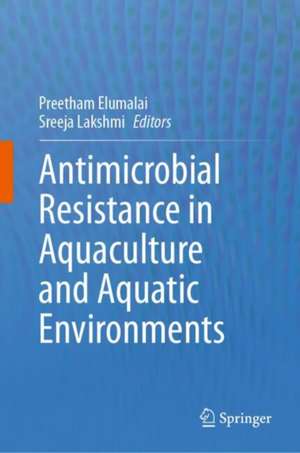Antimicrobial Resistance in Aquaculture and Aquatic Environments
Editat de Preetham Elumalai, Sreeja Lakshmien Limba Engleză Hardback – 8 noi 2024
Preț: 1229.28 lei
Preț vechi: 1499.12 lei
-18% Nou
Puncte Express: 1844
Preț estimativ în valută:
235.22€ • 256.31$ • 198.21£
235.22€ • 256.31$ • 198.21£
Carte tipărită la comandă
Livrare economică 23 aprilie-07 mai
Preluare comenzi: 021 569.72.76
Specificații
ISBN-13: 9789819773190
ISBN-10: 9819773199
Pagini: 400
Ilustrații: Approx. 400 p. 30 illus., 20 illus. in color.
Dimensiuni: 155 x 235 mm
Greutate: 0.78 kg
Ediția:2024
Editura: Springer Nature Singapore
Colecția Springer
Locul publicării:Singapore, Singapore
ISBN-10: 9819773199
Pagini: 400
Ilustrații: Approx. 400 p. 30 illus., 20 illus. in color.
Dimensiuni: 155 x 235 mm
Greutate: 0.78 kg
Ediția:2024
Editura: Springer Nature Singapore
Colecția Springer
Locul publicării:Singapore, Singapore
Cuprins
Chapter 1. Understanding AMR.- Chapter 2 Historical perspective and contribution of aquaculture to the AMR global pandemic .- Chapter 3 AMR in freshwater and marine environments.- Chapter 4 Antimicrobial resistance (AMR) in farmed aquatic organisms.- Chapter 5 Fish/shellfish food-borne and zoonoses and their impact on antimicrobial resistance in aquaculture.- Chapter 6 Screening and monitoring of AMR in wastewater facilities, recreation facilities and other aquatic environments.- Chapter 7 Pros and Cons of Diagnostic Methods Used for AMR Surveillance in Aquaculture.- Chapter 8 Assessing Antimicrobial Resistance in Aquafeed: A Holistic Screening and Monitoring Strategy.- Chapter 9 Public Health Food Safety (Farmed aquatic organisms/live stocks/crops).- Chapter 10 Phage therapy in Aquaculture.- Chapter 11 BACTERIOSIN AND PREDATORY BACTERIA.- Chapter 12 Application of probiotics, prebiotics and synbiotics in aquaculture.- Chapter 13 Bacteriocins as an antimicrobial agent for the treatment AMR in aquaculture.- Chapter 14 BIOSECURITY IN AQUACULTURE.- Chapter 15 Vaccination as an AMR Control/Preventive Measure in Aquaculture.- Chapter 16 The global approach: Aquaculture and National Action Plans for Antimicrobial Resistance.
Notă biografică
Dr.Preetham Elumalai, is an Associate Professor at the Department of Marine Biology, Cochin University of Science and Technology, Kochi, Kerala, India. He did his PhD in Biochemistry and Molecular Immunology from Institute of Immunology, University of Regensburg, Germany. His research practice is focussed on bioassay-guided identification of novel marine compounds, unveiling fish lectins in innate immune defence mechanisms, aquatic vaccine development, evaluation of cost-effective feed additives and nutrigenomics, and effects of environmental pollutants on marine ecosystems. He has published more than 80 peer-reviewed articles and has two patents in his name. He has authored 20 book chapters, edited six books and has presented his work at more than 70 national and international conferences. He has been awarded the prestigious INSA fellowship (2018); MASTS, Fellowship (2019); IVVN award, UK (2020); FRSB award (2021); and BactiVac award, UK (2022); Faculty Exchange Program 2024 under the RashtriyaUchchatar Shiksha Abhiyan (RUSA) 2.0 (2024) and ASEM-DUO (ARES program) (2024).
Dr. Sreeja Lakshmi is a Post-doctoral Research Scientist in collaboration with Moredun Research Institute, United Kingdom. She pursued her PhD in Biochemistry and molecular biology from University of Regensburg, Germany. Her research interests extend through functional attributes of bioactive compounds for therapeutic applications, development of nano and glycovaccines against aquatic diseases, novel treatment strategies against neurodegenerative disorders and protein biochemistry. She has published her works in peer reviewed journals and presented papers in national and international conferences. She has edited 5 books and authored 10 book chapters. She is awarded with research fellowship from Bayerischeforschungsstiftung (Bavarian Research Foundation), Govt. of Bavaria, Germany (2009); HRD fellowship for Women Scientists from Department of Health Research (DHR), Govt. of India (2017); MASTS-PECRE (Marine Alliance Science Technology, Scotland) Award for Post-doctoral and Early Career Research Exchanges (2019); Postdoctoral Research grant from IVVN (International Veterinary Vaccinology Network), United Kingdom (2020) and Project grant from BactiVac Network, University of Birmingham, United Kingdom (2021, 2023).
Dr. Sreeja Lakshmi is a Post-doctoral Research Scientist in collaboration with Moredun Research Institute, United Kingdom. She pursued her PhD in Biochemistry and molecular biology from University of Regensburg, Germany. Her research interests extend through functional attributes of bioactive compounds for therapeutic applications, development of nano and glycovaccines against aquatic diseases, novel treatment strategies against neurodegenerative disorders and protein biochemistry. She has published her works in peer reviewed journals and presented papers in national and international conferences. She has edited 5 books and authored 10 book chapters. She is awarded with research fellowship from Bayerischeforschungsstiftung (Bavarian Research Foundation), Govt. of Bavaria, Germany (2009); HRD fellowship for Women Scientists from Department of Health Research (DHR), Govt. of India (2017); MASTS-PECRE (Marine Alliance Science Technology, Scotland) Award for Post-doctoral and Early Career Research Exchanges (2019); Postdoctoral Research grant from IVVN (International Veterinary Vaccinology Network), United Kingdom (2020) and Project grant from BactiVac Network, University of Birmingham, United Kingdom (2021, 2023).
Textul de pe ultima copertă
This book provides the latest information on aquatic AMR from the perspective of inflammation and presents new ideas on the complicated mechanisms of lectin biochemistry and associated interactions. Key features include discussion of mechanisms recently identified to be involving surveillance and monitoring of AMR and AMU, presentation of the latest evidence regarding the molecular approaches in disease therapeutics, and thorough explanation of the concept of one health challenges and current understanding of the significance of its disease resistance related studies. Gene expression studies is another important element of the book, and it is proposed that gene editing technology provides gaining attention in the biological role of fresh water and marine environments. Examples of the many latest molecular approaches, applications and future perspectives in AMR specific topics covered in this book include the information right from the basics to the advancements in this area. The book will be a valuable update and resource for both experienced and younger researchers working in the field of marine biology and immunology.
Caracteristici
Shares functional roles of fish in antimicrobial and immunological responses Includes latest mechanisms in AMR research and possible applications in veterinary medicine Provides detailed insights on peculiarities of AMR and aquatic animals
